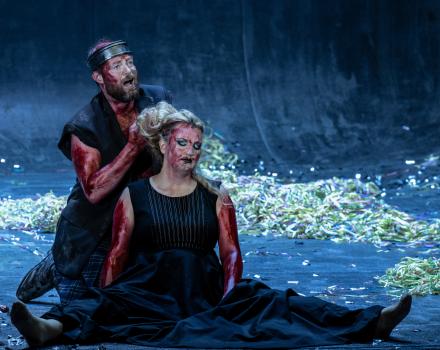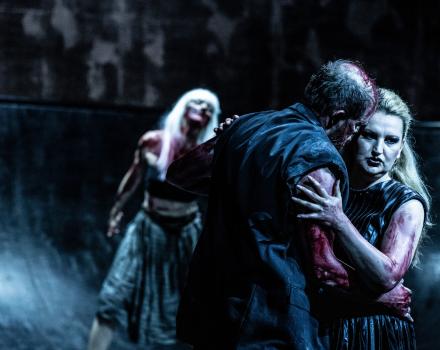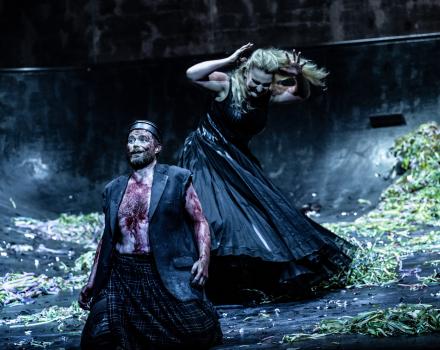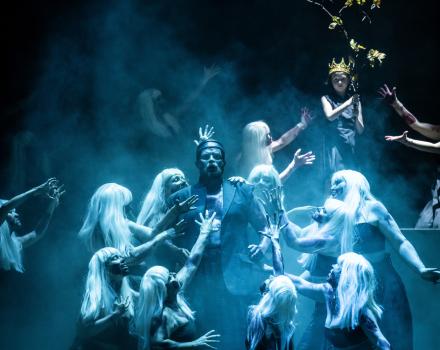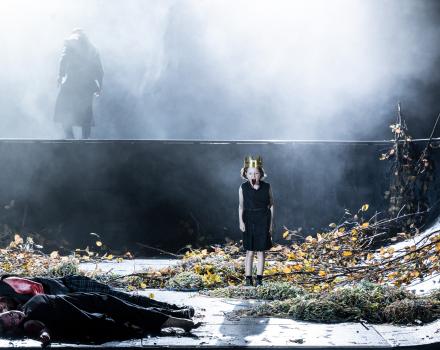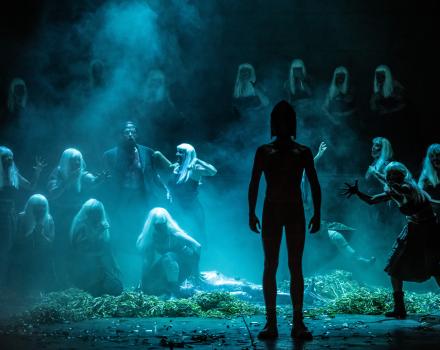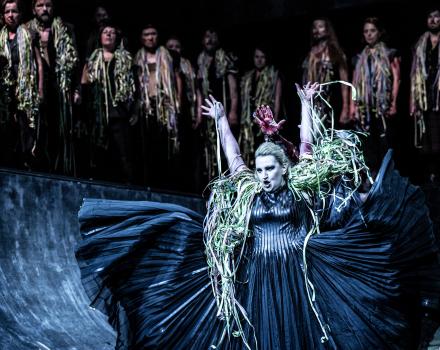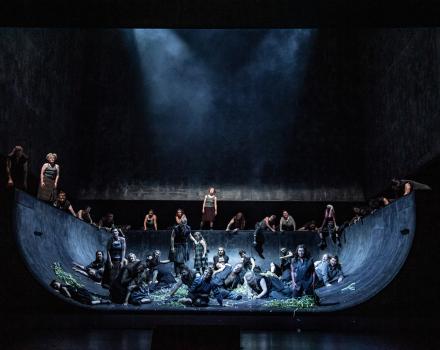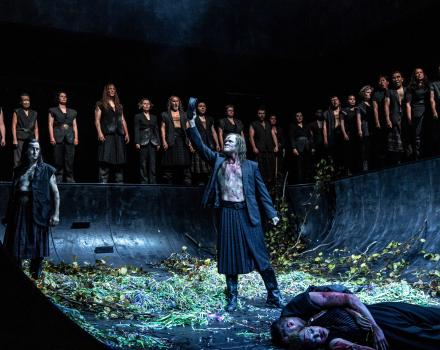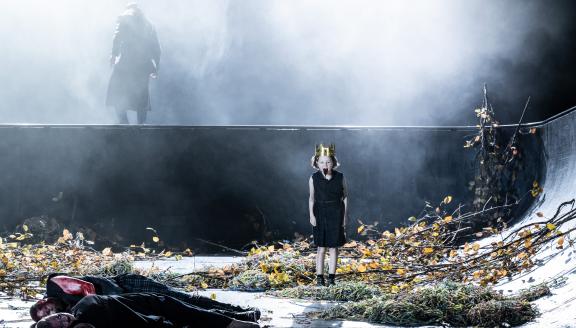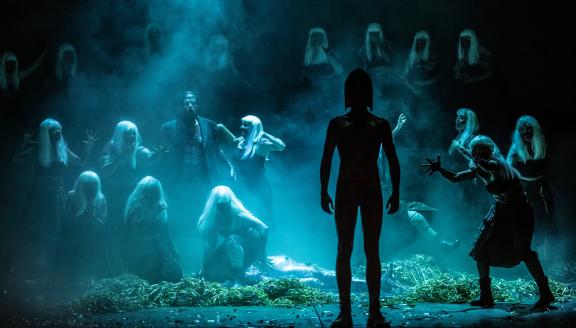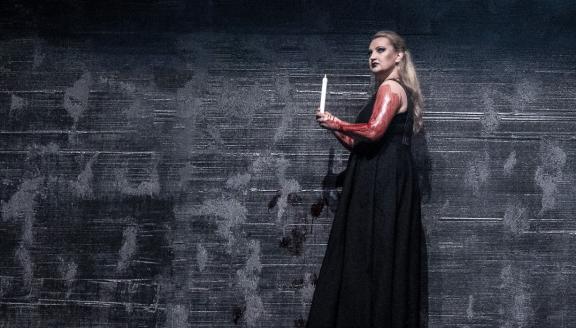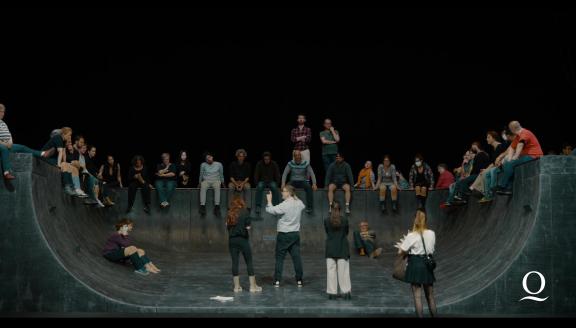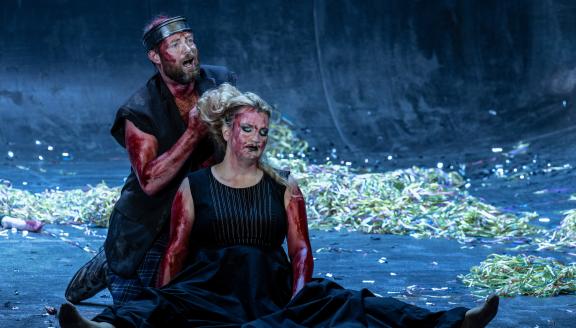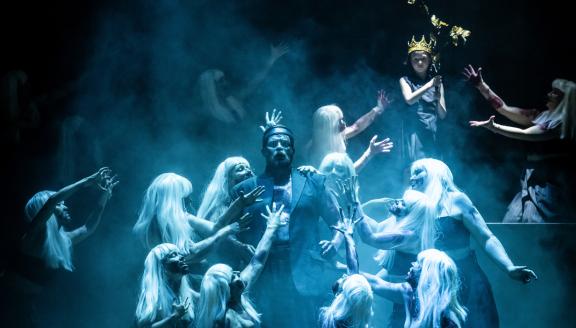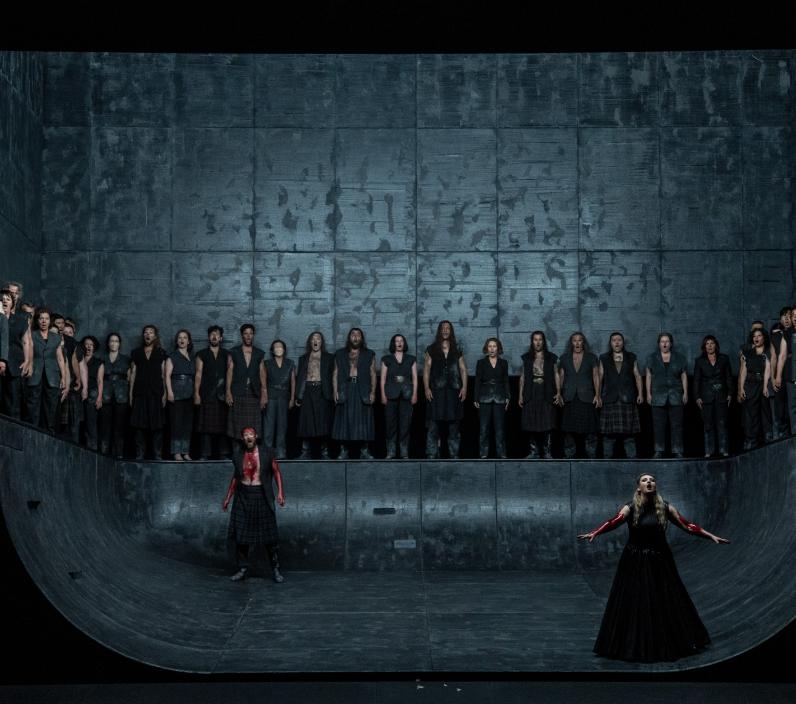
After a victorious battle, the witches predict a crown for the Scottish commander Macbeth. In response to the witches’ prophecies, Macbeth’s thirst for power is fuelled dangerously by his wife and they decide to murder their king Duncan in his sleep. With this act of blood, they unleash an unprecedented spiral of violence that will lead them straight into the abyss.
Macbeth is one of William Shakespeare's most demonic works. In order to capture the supernatural atmosphere of the original play, the ardent Shakespeare admirer Giuseppe Verdi composed closely to the text and boldly experimented with new timbres. In a remarkable stage design by Henrik Ahr, which resembles a huge cauldron, Michael Thalheimer focuses his production on Macbeth, Lady Macbeth and the witches. Verdi specialist Antonino Fogliani conducts a stellar production, in which the opulent choruses repeatedly provide musical highlights.
A co-production with Opera Ballet Vlaanderen.
Cast
Macbeth | Hrólfur Sæmundsson |
|---|---|
Lady Macbeth | Ewa Płonka |
Banco | Bogdan Taloș |
Macduff | Eduardo Aladrén |
Malcolm | David Fischer |
Macbeth’s servant, Doctor, Assassin, Apparition | Valentin Ruckebier |
Lady Macbeth’s lady-in-waiting | Mara Guseynova |
Apparitions | Josefine Nagerski Marie-Sophie Tétard |
Witch | Birte Hopstein |
Fleanzio | Marie-Sophie Tétard |
King Duncan | Norbert Kaulhausen |
Chorus | Deutsche Oper am Rhein Chorus |
Children Chorus | Akademie für Chor und Musiktheater e.V. |
Orchestra | Düsseldorfer Symphoniker |
| ... | |
Music | Giuseppe Verdi |
|---|---|
Text | Francesco Maria Piave |
Conductor | Antonino Fogliani |
Director | Michael Thalheimer |
Lighting | Stefan Bolliger |
Chorus Master | Gerhard Michalski |
Sets | Henrik Ahr |
Costumes | Michaela Barth |
Dramaturg | Bettina Auer Anna Grundmeier |
| ... | |
Videos
STORY
Act I
In a woods amidst bolts of lightning and thunder, three groups of witches appear. They meet two generals from King Duncan’s army, Macbeth and Banco, who are on their way back from a victorious battle. The witches greet Macbeth as Thane of Glamis and of Caudor, and as the future king of Scotland; they then greet Banco, telling him he will be happier than his companion, not a king, but the father of monarchs. The king’s messengers arrive, telling Macbeth that he has been appointed Thane of Caudor. Both Macbeth and Banco are amazed that the first prediction has come true.
In the hall in Macbeth’s castle, Lady Macbeth is reading a letter from her husband, describing what has happened. When a servant announces the arrival of King Duncan together with her husband, she has already devised a plan to murder the sovereign. In fact, no sooner has Macbeth arrived than he convinces her to carry out the murder. The king arrives and with him is his son Malcolm. Macbeth waits for nightfall so he can enter the king’s room and murder him. Distraught by such a criminal action, he is overcome with anguish whereas his wife remains calm: she takes the dagger covered in blood from Macbeth’s hands and places it next to the sleeping guards so that they will be accused of the crime. Macduff, one of the king’s servants, comes into Duncan’s room to wake him up and finds him dead. Everyone comes running when they hear his cries of fear, including Macbeth and Lady Macbeth, who join in the unanimous cursing against the king’s assassin.
Act II
Macbeth is the king of Scotland while Malcolm, Duncan’s son, has fled to England and is accused of having killed his father. Talking to his wife in a room in the castle, Macbeth admits he is worried about the prophecies the witches made regarding Banco, in particular the prediction that Banco would have fathered monarchs. Macbeth therefore nourishes the desire to eliminate both the general and his son. Once again, Lady Macbeth agrees with and encourages her husband.
The assassins are getting ready to kill Banco and his son Fleanzio in the park. They reach the two victims. Banco is overcome with a strange premonitory feeling of anguish: the killers attack and kill him, while his son manages to escape.
The court has been summoned to a banquet in a magnificent hall to celebrate the new king and Lady Macbeth makes a toast. In the wings, the assassin tells King Macbeth that Banco is dead but that his son has escaped unharmed. The king is about to take Banco’s place but his ghost, which is invisible to the others, stops him. Hallucinating, Macbeth begins speaking incoherently, frightening the guests. His wife tries to encourage him and repeats the toast, but once again Macbeth sees Banco’s ghost and cries out in fear, frightening the onlookers and making them take their leave.
Act III
In a dark cave, the witches are making spells and dancing. Macbeth arrives, wanting to question them about his own future. Three apparitions are conjured up: he must be on his guard against Macduff, no newborn female will harm him, and he will be invincible as long as Birnam Forest does not move against him. Still dissatisfied, Macbeth asks if Banco’s descendants will rule after him: eight ghosts of kings appear, the last of which is none other than Banco who, with a mirror in his hand reflects the images of future kings and points at his royal offspring. Macbeth throws himself against the ghosts like a madman in an attempt to destroy them, but he falls to the ground exhausted and faints. Around him, ondines and sylphs begin dancing. Once he comes to, with his wife at his side Macbeth decides to exterminate Banco and Macduff’s family.
Act IV
At a deserted place on the border between Scotland and England, Macduff has set up camp with Scottish refugees and political exiles. They are lamenting the fate of their oppressed homeland. Macduff is also thinking about his family who was murdered on Macbeth’s orders. Malcolm joins them at the head of the English allies and then tells each soldier to take a branch in Birnam Forest to camouflage themselves and approach the castle of the enemy king.
A doctor and lady-in-waiting are in the castle helping Lady Macbeth, who has been overcome with madness. She is continuously rubbing her hands to get rid of an invisible splash of blood. Without realising who is around her, she walks around the castle like a mad, exhausted sleepwalker, a victim of the most atrocious feelings of remorse.
Macbeth is frightened: although he is reassured by the prophecy that no female offspring can harm him, he regrets not having any heirs. He is not disturbed by the news of Lady Macbeth’s death; instead, he is struck when his soldiers tell him that Birnam Forest is moving towards the castle. The king takes his sword and rushes to the battlefield.
On a vast plain, the English soldiers are advancing, hidden by their branches. Once they have thrown them aside, they unsheathe their swords and throw themselves into battle. Macduff reaches Macbeth and, telling him that he was not born from a woman but removed from the womb earlier, kills him. Malcolm is proclaimed King of Scotland.
INSIGHTS
A crown made of lead
A conversation between dramaturg Katherina Lindekens and director Michael Thalheimer
What fascinates you about Shakespeare's work?
I could work on Shakespeare all my life without ever fully grasping him. He is an unfathomable genius. What fascinates me most about his universe is that all his works revolve around three major thematic blocks: Love, Power and Death. There is something universal and archetypal about his plays. That is what makes them so timeless. Every generation can be inspired by them and at the same time must find its own key to get to grips with them.
In your staging, one really can feel the nihilism of the play...
I know very few operas that are so gloomy. Like German playwright Heiner Müller, Verdi reduced Macbeth to the absolute core of the drama. According to Verdi, the play is characterised by three main characters: Macbeth, Lady Macbeth and the witches. The entire tragedy revolves around them.
What do you make of this triangle, especially since Lady Macbeth becomes even more significant for Verdi than in Shakespeare's original?
Macbeth is a feeble character. Or rather: he is powerful, but has an even more powerful wife at his side. He loves her and does everything to make her happy. That is precisely what makes him weak. Together they dream of the crown. And when a group of witches actually predicts exactly that, it can be assumed that they will be believed. The witches can be read as a visualisation of our society today, which calls on the individual to always have, want and do more. We are condemned to succeed. Essentially, Macbeth is dealing with a self-fulfilling prophecy. The witches are in his head, they are part of himself. And he designs his own destiny by trying to make his wife happy.
Do you think he is acting out of love?
Not in the traditional sense. It is no coincidence that Macbeth is the only opera by Verdi that does not contain a love duet. But you can't call the piece love-less either. I think that the Macbeths love each other in a twisted way. They are dependent on each other, but lonely in their togetherness. He is aware that she desires a powerful man and so he does everything to fulfil that desire - even murdering King Duncan while he is visiting them. Lady Macbeth whispers all sorts of atrocities to her husband, and he follows. As they commit the murders together, they enter a downward spiral that eventually drives them mad. She turns inwards, he turns outwards - both in equally destructive ways.
The ambition even extends beyond life: the thought that Banquo's son could ever become king is unbearable for Macbeth.
Yes, this obsession, this fantasy is in his head and in his heart. His race to the top is a scenario that happens automatically. The only thing is: Macbeth desperately wants to become king, but has never asked himself whether he can fulfil this task. The same is true for Lady Macbeth. The couple has no vision, craves only power. Then what happens? The task grows way over their heads. They lose all control - of themselves and of the kingdom. Beneath their crown gapes an immense void, an enormous fear of failure, to which unrestrained violence is the only answer. This mechanism can still be observed in politics today. Because Macbeth cannot cope with his role, he stirs up violence and brutality out of his own fear and frustration. Anyone who is against him is put out of action.
So the Macbeths' personal tragedy is also political?
Absolutely. Macbeth is a political play. It is set in times of war between queens and kings. At the same time, this drama transcends politics: it is a universal story, an archetype.
In the costume department there are long racks of kilts. An interesting choice for a play in which the boundaries between masculinity and femininity are blurred.
Gender is indeed a constant theme in Macbeth. For example, in Shakespeare's famous banquet scene, Macbeth is driven mad when he sees the ghost of the dead Banquo sitting at the table. Lady Macbeth challenges her hallucinating husband by appealing to his manhood: ‘Are you a man?’ On the other hand, she also addresses her masculinity before Duncan's murder: ‘Come, you Spirits / That tend on mortal thoughts, unsex me here, / And fill me, from the crown to the toe, top- full / Of direst cruelty!’ The relationship between the Macbeths turns all gender clichés on their heads. He is portrayed as weak, she as a savage. By dressing them all in kilts and giving them long hair, we play with the theme that runs through Verdi's opera: it is not always obvious who are the men and who are the women.
Costumes in Shakespeare's Macbeth are also always a metaphor for power. About King Macbeth is stated: ‘Now does he feel his title / Hang loose about him, like a giant’s robe / Upon a dwarfish thief’.
Exactly, and that brings us back to the beginning: the kingdom and the crown are too big for the weak Macbeth.
Gallery
